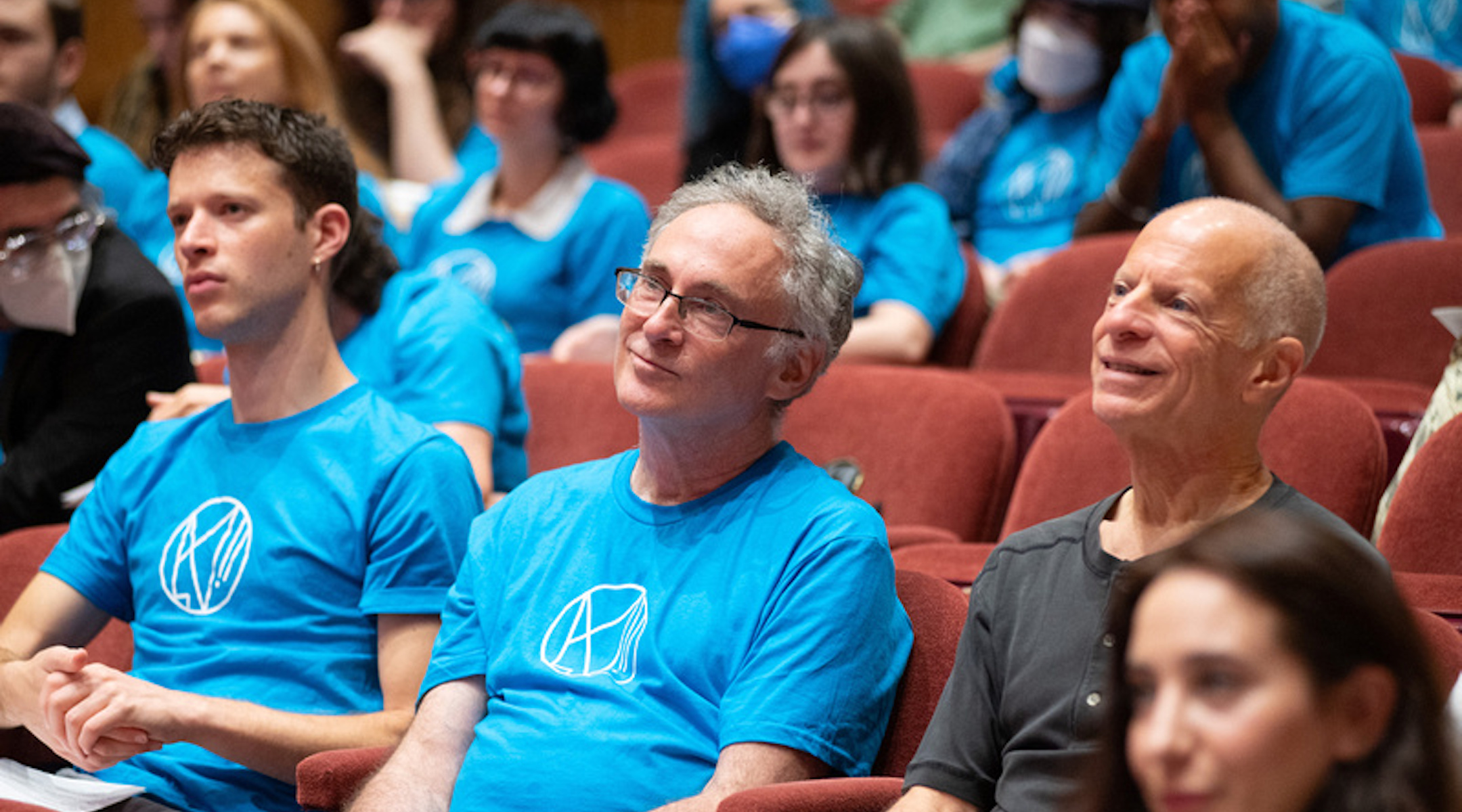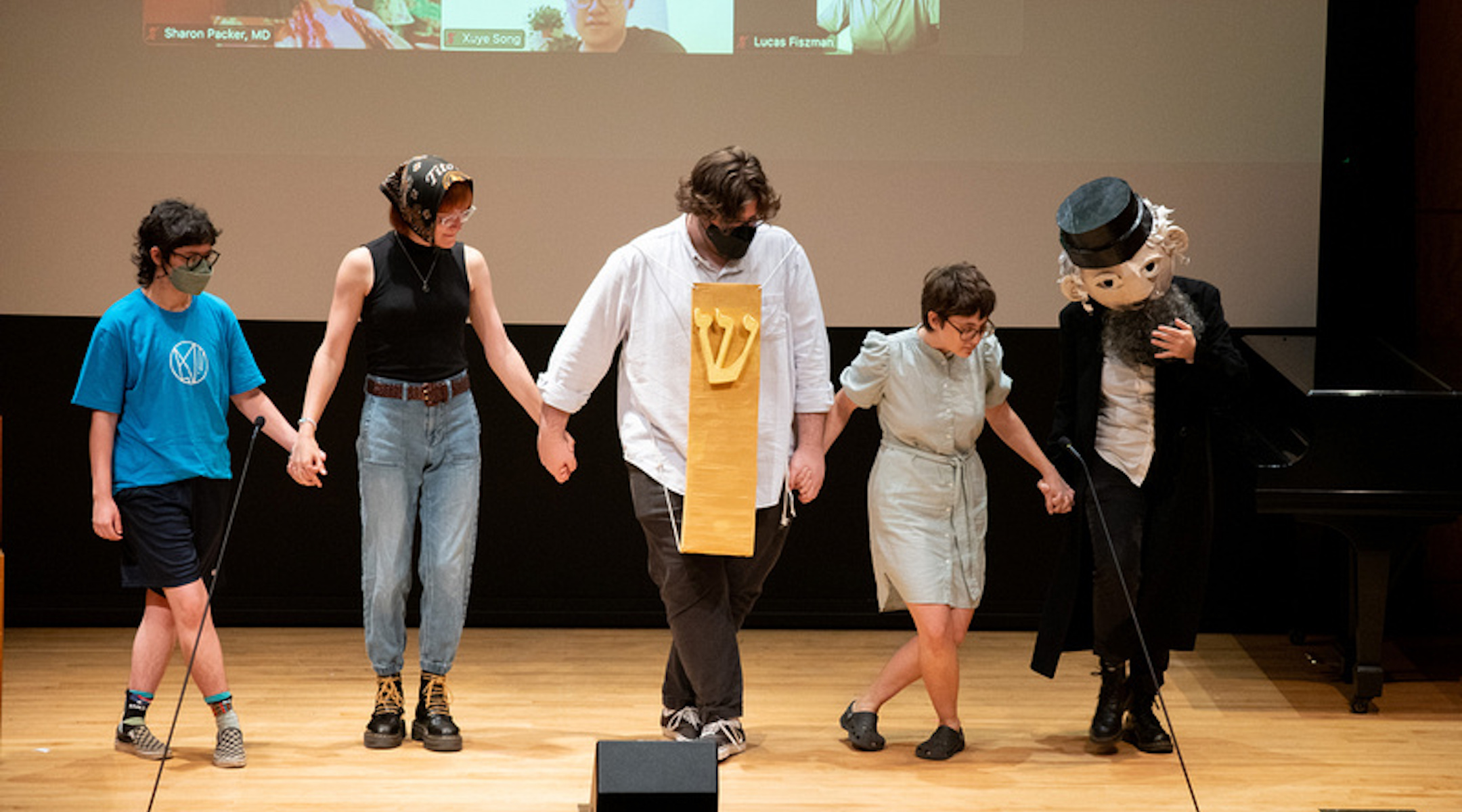When Tara Neuwirth arrived in New York City in June for six weeks of intensive Yiddish study at the YIVO Institute for Yiddish Research, she knew what to expect — this summer was her third time taking the course over four decades.
The first time the Los Angeles native took the course was more than 40 years ago, when she was a graduate student studying Russian Literature and minoring in Yiddish at Yale. The second time was in 2022, when she returned to brush up on the Yiddish she had learned but never really practiced. This year, Neuwirth came ready to hit the ground running: Alongside her coursework, she brought along a project translating letters and articles on behalf of a family whose grandfather wrote for the Yiddish Daily Forward in the mid-twentieth century.
“In some ways, this year has been the most personal,” Neuwirth, who is in her 60s, told the New York Jewish Week. “This year, I’ve been able to ask myself, ‘Why am I studying Yiddish? What do I want to do with it?’ What I want to do is translate, because I don’t want literature to be lost. I now feel more of a commitment than I did before to not let Yiddish be lost to the world — and not just Yiddish, but the culture of it.”
Neuwirth is one of 40 students from around the world who came to New York to participate in YIVO’s summer intensive program, called the Uriel Weinreich Summer Program for Yiddish Language, Literature and Culture; another 30 people joined the full-time course over Zoom. Last Friday, these students — who range in age from 16 to 84 and hail from countries as diverse as Lithuania, India and Poland — held their graduation ceremony, or siem in Yiddish, at YIVO’s headquarters near Union Square. The celebration included skits, poems and songs performed entirely in the Eastern European Jewish language; non-speakers could still get the feeling of the event as they watched the crowd of about 50 laugh, sing and clap in unison as different groups of students moved through their presentations.

The Uriel Weinrich Summer Programs draws a diverse range of students from around the world. (Melanie Einzig)
Ben Kaplan, YIVO’s director of education, said the program was the first, and longest-running, Yiddish intensive on offer – and gave students more than just language instruction.
“We see Yiddish as a civilization that should be studied in all its richness and complexity,” he said.” We’re always kind of fighting against the current a little bit, because some folks just see it as a silly, funny language, or the language of grandma and grandpa, as opposed to a very rich, deep language that has all kinds of seriousness.”
The program, which has been running continuously since 1968, draws students for a variety of reasons. Many are graduate students studying German, which is similar to Yiddish, or literature or an aspect of Eastern European history. Some are seeking to supplement their coursework: YIVO’s program allows students to earn college credit through a partnership with Bard College. Others are Askenazi Jews who want to know more about their ancestry, and still others are professional artists who want to learn more about Yiddish works in their fields, such as theater or music.
“You have the older folks that have so much wisdom to pass down and share in life experience, which really enriches the classroom,” Kaplan said. “Then you have younger folks who are really excited and passionate and just starting out and are looking back towards the previous generation, while looking forward to the future.”
The intensive, Kaplan said, grew significantly in 2020, the first year YIVO started offering the program online due to the pandemic. (The in-person enrollment has held relatively steady at approximately 40 students, said Kaplan, and Zoom has enabled YIVO to add an online component. ) That change also made the program accessible to students worldwide, including many who couldn’t come to New York for the summer, as well as students who prefer studying at home.
“Being online really opens up options,” Kaplan said. “It’s the same core curriculum and you get it delivered to you directly. That’s very, very powerful as a pedagogical tool.”
A major aspect of the in-person program is a focus on Yiddish culture. Students take field trips to the Lower East Side, a bastion of Yiddish in generations past, and the Satmar Hasidic community in Williamsburg, where it is used today as a lingua franca. They also go to Long Island City to visit CYCO, the last surviving independent Yiddish bookstore in the city.
Syed Habeeb Tehseen, a PhD student at Duke University from India, is studying German film, and needed to learn Yiddish to supplement his coursework. “Personally, I really just like the language and when I was exposed to it initially, I just wanted to learn more of it, Because I just love reading literature, not in translation, but in the original,” said Tehseen, who is not Jewish. “I felt like I wanted to learn more and more of it.”
Aistė Puidokatė is a librarian at the National Library of Lithuania, and took the course so that when she returned home to Vilnius, she’d be able to read and translate thousands of Yiddish documents in the archives at the library.
“I needed to get better knowledge of Yiddish because I work with Yiddish documents — I read them, I organize them, I photograph them,” the 32-year-old, who is likewise not Jewish, told the New York Jewish Week.
She said the course vastly improved her Yiddish reading skills, which is what she needed for her work. But she came away with more than she expected: “I’ve come to love Yiddish culture,” she said, pointing especially to the classes she took on Yiddish literature and on the “kumzitz,” a traditional Yiddish song circle.
The six-week program divides students into four different levels, ranging from beginners to fluent speakers. A rigorous academic undertaking, the summer intensive combines three hours of classes on language and literature in the mornings with conversation classes and electives — which include courses on Yiddish theater, song, music and cooking, as well as archival research and translation — in the afternoons.
“It’s a family dynamic,” said Dovid Braun, the program’s academic director. “You get to know people, you get to create a community really unlike anything else … Here, this was your choice to spend your summer here. We have people who are devoted to it, who really want to be here. This is their summer plan and their pleasure to be here.”
For Kasia Świerad-Redwood, a native of a small town near Poland’s Galicia region and a PhD candidate in history at Notre Dame who is studying cultural nation-building in Eastern Europe, understanding the now-absent Yiddish culture that once permeated her country has been a personal and professional mission.
Świerad-Redwood, who is not Jewish, said that until she started the YIVO course, “I didn’t realize just how enmeshed the two cultures were in Poland.”
For example, she realized that many of the songs and lullabies she grew up with were actually Yiddish. She described her YIVO education as “a really moving process,” realizing “what kind of country it [Poland] could have been versus what kind of country it has become,” Świerad-Redwood told the New York Jewish Week. “It’s difficult to realize that so much diverse, beautiful culture was lost from my place of origin, and that I never had a chance to experience it and be a part of it, especially coming from a town that had a really large Jewish population before the before the Holocaust, and also realizing just how little memorialization of that culture there is in my town and my hometown.”
Studying in New York City has helped her understand that Yiddish is not an esoteric culture of the past.
“Part of why it’s so moving as well to be in New York is because it is a live culture — we’re able to go to Williamsburg and other places [and] see just how much of it there is,” she said. “In Europe, there’s a very clear line between what was and what is. But, in New York, you get a lot of a lot more blurred lines, which has been so crazy.”
Kaplan also said the program tries to teach about Yiddish life alongside tragedy.
“Something we talk a lot about at YIVO is that we see it as a living and culture,” Kaplan said “In this field, we focus a lot on the Holocaust and ruptures and the destruction of the culture, which is obviously very important to focus on — but we also want to focus on the ways people lived for centuries and the amazing music and literature and foodways they made.”
The New York Jewish Week brings you the stories behind the headlines, keeping you connected to Jewish life in New York. Help sustain the reporting you trust by donating today.





